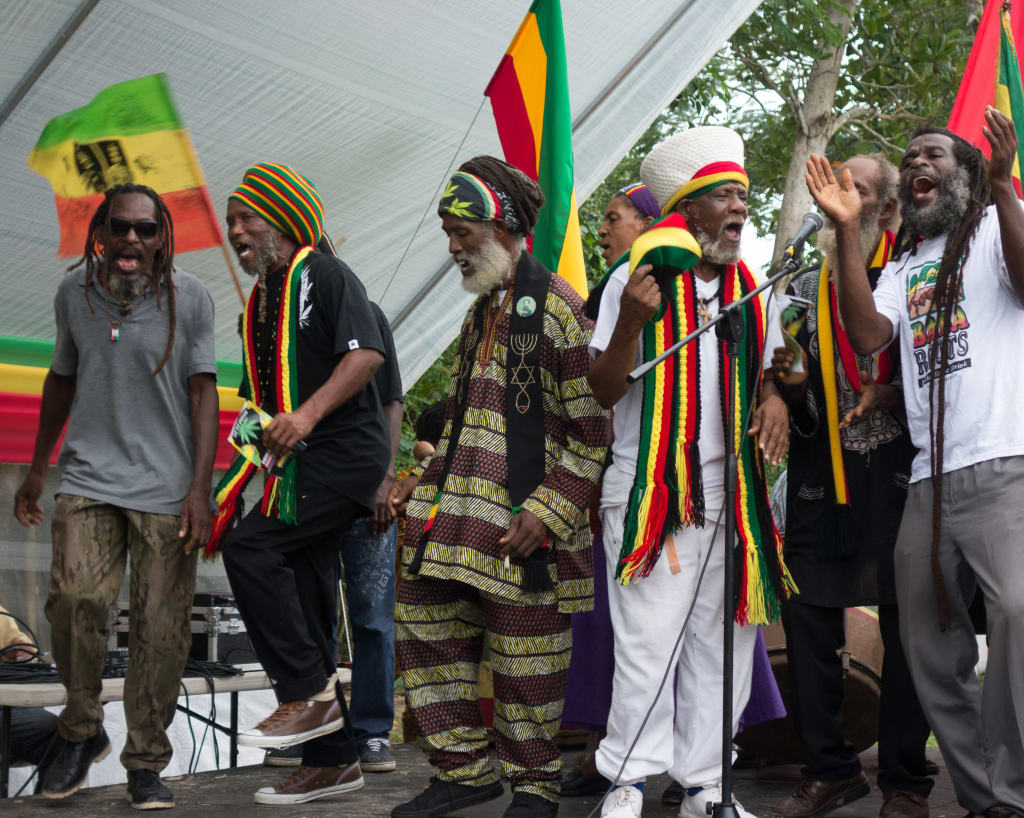
Rastafarianism is a spiritual and cultural movement that originated in Jamaica during the 1930s. It is based on a deep reverence for Jah, the divine force that is believed to exist within all living things. Rastafarianism places a strong emphasis on equality, social justice, and respect for nature. It also has a unique set of lifestyle and dietary choices that are believed to enhance spiritual well-being.
Adhering to Rastafarianism is more than just a religious practice - it is a way of life. True adherents to Rastafarianism strive to embody the principles and values that are at the core of this movement. In this blog post, we will explore some of the key characteristics that define a true adherent to Rastafarianism. By understanding these characteristics, we can gain a greater appreciation for the beauty and depth of this spiritual movement and its teachings.
Deep faith in Jah
One of the defining characteristics of Rastafarianism is its deep faith in Jah, which is considered to be the supreme being that is present in all things. In Rastafarianism, Jah is believed to be the divine force that created the universe and continues to guide and protect us.
Belief in Jah is of utmost importance for Rastafarians, as it serves as the foundation of their spiritual practice. Through their faith in Jah, Rastafarians seek to connect with the divine and align their lives with the principles and values that are at the core of Rastafarianism.
Rastafarians express their faith in Jah in various ways, including through prayer, meditation, and the reading of sacred texts such as the Bible and the Holy Piby. Rastafarians also use music as a means of expressing their devotion to Jah. Reggae music, in particular, has been closely associated with Rastafarianism, with many songs containing lyrics that praise Jah and celebrate the spiritual journey.
Emphasis on equality and social justice
Another key characteristic of Rastafarianism is its emphasis on equality and social justice. Rastafarianism was born out of the struggle of black Jamaicans against colonialism and racism, and as such, it has always placed a strong emphasis on the principles of equality and social justice.
Rastafarians believe that all people are equal in the eyes of Jah and should be treated as such. This belief is reflected in the way that Rastafarians interact with others and in their advocacy for social justice causes. Rastafarians have been at the forefront of movements for racial and social equality, advocating for the rights of marginalized groups and working to combat discrimination and inequality in all its forms.
Rastafarians also seek to create a more just and equitable society by promoting sustainable and equitable economic systems. Many Rastafarians practice self-sufficiency and communal living, working together to create self-sustaining communities that are independent of the dominant economic systems that perpetuate inequality and exploitation.
Reverence for nature
Rastafarianism places a great deal of emphasis on the importance of nature and the environment. Rastafarians believe that all of creation is connected and that we have a responsibility to care for the natural world around us.
Rastafarians express their reverence for nature in a variety of ways. Many Rastafarians practice sustainable living and engage in activities such as organic farming, permaculture, and other forms of eco-friendly living. Rastafarians also believe in the importance of preserving natural habitats and protecting endangered species.
In addition to these practical expressions of respect for nature, Rastafarians also view the natural world as a manifestation of Jah's divine presence. They believe that by caring for the environment, we are also expressing our devotion to Jah and deepening our spiritual connection to the divine.
Lifestyle and dietary choices
Lifestyle and dietary choices are also important characteristics of Rastafarianism. Rastafarians place a great deal of importance on living a healthy and holistic lifestyle, and they believe that what we put into our bodies has a significant impact on our spiritual well-being.
Dietary choices are particularly important for Rastafarians, who often follow a strict vegan or vegetarian diet. This is based on the belief that consuming meat or other animal products can interfere with our spiritual connection to Jah and can cause harm to other beings in the natural world. Instead, Rastafarians focus on eating a diet that is based on fresh fruits, vegetables, and grains, and they often prepare their food using traditional cooking methods.
In addition to dietary choices, Rastafarians also practice a variety of other lifestyle choices that are designed to promote spiritual well-being and connection to the divine. These can include practices such as meditation, yoga, and communal living, as well as the use of natural remedies for healing and self-care.
The importance of these lifestyle and dietary choices in Rastafarianism is rooted in the belief that our physical and spiritual well-being are intimately connected. By living a healthy and holistic lifestyle, Rastafarians are able to cultivate a deeper connection to Jah and to live their lives in a way that is in alignment with their spiritual principles and values.
Music and art
Music and art play a significant role in Rastafarianism, both as expressions of faith and as important cultural practices. Rastafarianism has a rich history of music and art, which have been used to express spiritual and political messages and to create a sense of community among adherents.
One of the most well-known forms of Rastafarian music is reggae, which emerged in Jamaica in the 1960s and quickly became associated with Rastafarianism and its cultural and spiritual values. Reggae music is characterized by its distinctive rhythms and lyrics, which often reflect the struggles and aspirations of the Rastafarian community. Some of the most famous Rastafarian musicians include Bob Marley, Peter Tosh, and Bunny Wailer, who helped to popularize reggae music around the world and to spread the message of Rastafarianism.
In addition to music, art also plays an important role in Rastafarianism. Rastafarian art is characterized by its use of bold colors and patterns, and often incorporates symbols and imagery that are significant to the Rastafarian faith. Rastafarian art can be found in a variety of forms, including paintings, murals, and sculptures, and is often used to create a sense of community and to express spiritual and political messages.
The significance of music and art in Rastafarianism is rooted in the belief that these forms of expression have the power to inspire and uplift the spirit, and to create a sense of connection and community among adherents. Through music and art, Rastafarians are able to express their faith, to promote social justice and equality, and to create a sense of solidarity and belonging among the Rastafarian community.
Conclusion
A true adherent to Rastafarianism is characterized by a deep faith in Jah, a commitment to social justice and equality, a reverence for nature, a dedication to a healthy and holistic lifestyle, and a passion for music and art. These characteristics are central to the Rastafarian faith and are seen as essential for living a spiritually fulfilling life.
The importance of these characteristics in Rastafarianism is rooted in the belief that they are essential for creating a more just and equitable world, and for fostering a deeper spiritual connection with Jah and with the natural world. By living in accordance with these principles, Rastafarians are able to create a sense of community and belonging, and to promote values such as peace, love, and unity.
As readers, we can learn more about Rastafarianism and its principles by exploring its history, culture, and beliefs. By doing so, we can gain a deeper understanding of this vibrant spiritual movement and its contributions to the world. Whether we are Rastafarians ourselves or simply interested in learning more about this fascinating faith, we can all benefit from exploring its principles and learning more about the values that it promotes.
Final Note
If you’re interested in exploring who is Jah and Rastafarian culture further, we invite you to check out Fifth Degree’s collection of Rastafarian clothing. Our clothing is designed to reflect the spirit and teachings of Rastafarianism, with bold colors, empowering messages, and a commitment to sustainability and ethical production. We believe that what you wear can be a powerful expression of your values and beliefs, and we’re proud to offer a range of high-quality, stylish, and socially conscious clothing for individuals who are seeking to live in harmony with nature and the divine. Visit our website today to learn more about our collection and find the perfect Rastafarian clothes for woman for you.






Comments
There are no comments for this story
Be the first to respond and start the conversation.